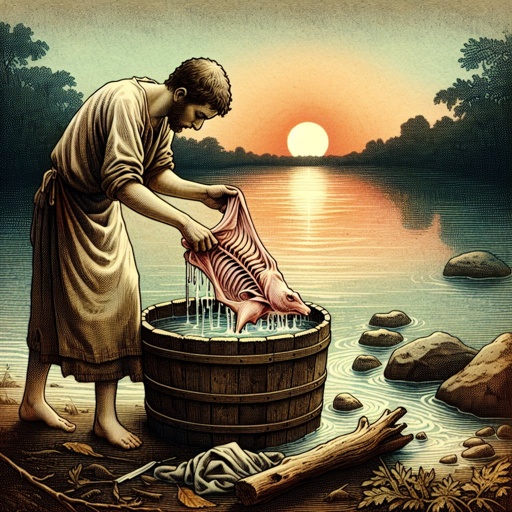What does Leviticus 25:36 mean?
"Take thou no usury of him, or increase: but fear thy God; that thy brother may live with thee." - Leviticus 25:36

Leviticus 25:36 - "Take thou no usury of him, or increase: but fear thy God; that thy brother may live with thee."
Leviticus 25:36 in the King James Version of the Bible states: "Take thou no usury of him, or increase: but fear thy God; that thy brother may live with thee."
This verse is part of the Old Testament book of Leviticus, which contains laws and regulations for the ancient Israelites. Specifically, this verse comes from a section that addresses the practice of lending money to those in need. In ancient times, money lending was a common practice, and this verse sets out guidelines for how Israelites should conduct themselves when lending to their fellow countrymen.
The verse begins with the commandment: "Take thou no usury of him, or increase." Usury refers to the practice of charging interest on loans, and in this context, it specifically refers to charging interest on loans to fellow Israelites. The Israelites were instructed not to practice usury when lending money to their brethren. This commandment was rooted in the idea of fairness and compassion, as charging interest on loans could potentially burden the borrower and perpetuate cycles of poverty.
The verse then emphasizes the importance of fearing God. This fear is not one of terror, but rather a reverent awe and respect for the Lord. The fear of God is a recurring theme throughout the Bible, and it serves as a reminder to the Israelites to conduct themselves with righteousness and integrity in all their dealings, including financial transactions.
The final part of the verse states the reason for the injunction against usury: "that thy brother may live with thee." This phrase highlights the underlying principle of caring for one's fellow man. By refraining from charging interest on loans, the Israelites were ensuring that their brethren would not be burdened by debt and could maintain a decent standard of living. This was in line with the broader biblical principle of loving one's neighbor as oneself.
In the broader context of Leviticus, this verse is part of a section that addresses various social and economic laws designed to promote justice, fairness, and responsibility within the community of Israel. The book of Leviticus as a whole contains a comprehensive code of conduct for the Israelites, including regulations for worship, dietary laws, and ethical guidelines for daily living. The verse in question reflects the importance of economic and social justice within this code.
On a deeper level, this verse also holds significance as a reflection of the character of God. Throughout the Bible, God is portrayed as a God of justice and mercy, who cares deeply for the well-being of His people. This verse reinforces the idea that God desires His people to treat one another with fairness, compassion, and generosity. It also underscores the importance of placing trust in God rather than exploiting others for personal gain.
Symbolically, this verse serves as a reminder of the importance of embodying God's character in our interactions with others. It challenges us to examine our own attitudes towards money, lending, and generosity. It encourages us to consider how we can promote justice and mercy in our financial dealings and how we can demonstrate a genuine fear of God in all areas of our lives.
In conclusion, Leviticus 25:36 is a powerful verse that addresses the ethical and moral implications of lending and borrowing within the ancient Israelite community. It emphasizes the importance of fairness, compassion, and reverence for God in all financial transactions. This verse continues to serve as a timeless reminder of the principles of justice and mercy that are foundational to the Christian faith. It challenges us to consider how we can embody these principles in our own lives and relationships, and it encourages us to trust in God's provision rather than seeking personal gain at the expense of others.
Leviticus 25:36 Artwork

Leviticus 25:36 - "Take thou no usury of him, or increase: but fear thy God; that thy brother may live with thee."

Genesis 36:25 - "And the children of Anah were these; Dishon, and Aholibamah the daughter of Anah."

Job 36:25 - "Every man may see it; man may behold it afar off."

Leviticus 25:26 - "And if the man have none to redeem it, and himself be able to redeem it;"

Leviticus 25:34 - "But the field of the suburbs of their cities may not be sold; for it is their perpetual possession."

Leviticus 25:1 - "And the LORD spake unto Moses in mount Sinai, saying,"

Leviticus 8:36 - "So Aaron and his sons did all things which the LORD commanded by the hand of Moses."

Exodus 25:36 - "Their knops and their branches shall be of the same: all it shall be one beaten work of pure gold."

Exodus 36:25 - "And for the other side of the tabernacle, which is toward the north corner, he made twenty boards,"

Leviticus 11:36 - "Nevertheless a fountain or pit, wherein there is plenty of water, shall be clean: but that which toucheth their carcase shall be unclean."

Leviticus 16:25 - "And the fat of the sin offering shall he burn upon the altar."

Jeremiah 25:36 - "A voice of the cry of the shepherds, and an howling of the principal of the flock, shall be heard: for the LORD hath spoiled their pasture."

Leviticus 7:36 - "Which the LORD commanded to be given them of the children of Israel, in the day that he anointed them, by a statute for ever throughout their generations."

Leviticus 25:24 - "And in all the land of your possession ye shall grant a redemption for the land."

Leviticus 13:36 - "Then the priest shall look on him: and, behold, if the scall be spread in the skin, the priest shall not seek for yellow hair; he is unclean."

Leviticus 25:13 - "In the year of this jubile ye shall return every man unto his possession."

Leviticus 25:23 - "¶ The land shall not be sold for ever: for the land is mine; for ye are strangers and sojourners with me."

Leviticus 25:7 - "And for thy cattle, and for the beast that are in thy land, shall all the increase thereof be meat."

Leviticus 25:43 - "Thou shalt not rule over him with rigour; but shalt fear thy God."

Matthew 25:36 - "Naked, and ye clothed me: I was sick, and ye visited me: I was in prison, and ye came unto me."

Leviticus 25:32 - "Notwithstanding the cities of the Levites, and the houses of the cities of their possession, may the Levites redeem at any time."

Leviticus 27:25 - "And all thy estimations shall be according to the shekel of the sanctuary: twenty gerahs shall be the shekel."

Jeremiah 36:25 - "Nevertheless Elnathan and Delaiah and Gemariah had made intercession to the king that he would not burn the roll: but he would not hear them."

Leviticus 25:12 - "For it is the jubile; it shall be holy unto you: ye shall eat the increase thereof out of the field."

Leviticus 25:40 - "But as an hired servant, and as a sojourner, he shall be with thee, and shall serve thee unto the year of jubile:"

Leviticus 25:25 - "¶ If thy brother be waxen poor, and hath sold away some of his possession, and if any of his kin come to redeem it, then shall he redeem that which his brother sold."

Leviticus 25:42 - "For they are my servants, which I brought forth out of the land of Egypt: they shall not be sold as bondmen."

Leviticus 11:25 - "And whosoever beareth ought of the carcase of them shall wash his clothes, and be unclean until the even."

Leviticus 25:48 - "After that he is sold he may be redeemed again; one of his brethren may redeem him:"

Leviticus 25:19 - "And the land shall yield her fruit, and ye shall eat your fill, and dwell therein in safety."